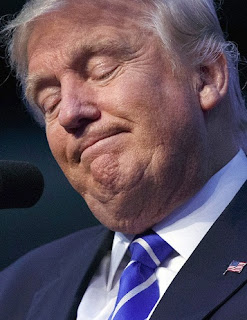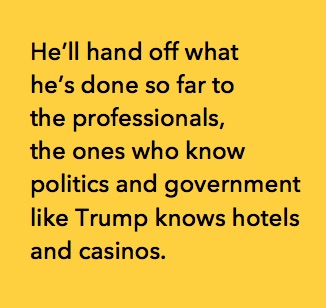Donald Trump, the necessary unnecessary apprentice
DONALD TRUMP’S chilly longtime catchphrase, the one he used to achieve power and prominence in the world of reality TV not so long ago, has been too much and too long a fact of American life since the Great Recession, a time when irony and schadenfreude have become not-so-strange bedfellows in our politics.
The Donald assumes the presidency at noon eastern time one week from today, taking the helm of the world’s oldest popularly-elected representative democracy. Ironically, it’s at that moment of great national importance, pompous and circumstantial, when Trump’s stock begins to fall in value. It’s that time when the wish for calamity to befall him and others — schadenfreude — will start to be granted, and not just by his political opposites.
That’s when, in some and several ways that will not be comfortable for the Republican Party leadership to readily admit, the political and electoral services of Donald John Trump will begin to no longer be required.
◊ ◊ ◊
After he takes the oath of office, he’ll have done what they needed him to do at the start of his campaign: win back the White House, energize the base and advance the right-wing social agenda.
Like any good contract worker, Trump will have fulfilled the terms of his (18-month) contract. He’ll then be in a position to hand off what he’s done so far — and you’ve done so very much, Donald — to the professionals, the ones who know politics and government like Trump knows hotels and casinos ... and buh-bye. Mission accomplished, sir. Leave your cardkey with the receptionist.
This, in practical political terms, is one reason why the tenure of the Trump administration is likely to be a short one. The other, deeper reason is statutorial. When a president is gravely, constitutionally wounded from the literal dawn of his time in the White House, any hope of really governing is a waste of time. Passing the muster of adherence to the United States Constitution tops everything else; that fact may not be immediately apparent, but sooner or later, it will be, and it’ll be unavoidably apparent when it is.
When a president is a constitutional transgressor the way Trump is — brandishing a flat-out disregard for the boundaries of our founding document, the operator’s manual of the United States government — it makes his hold on the presidency that much more tenuous, and his tenure in the office that much more of a liability to a Republican Party that doesn’t need any more headaches.
◊ ◊ ◊
THE HEADACHES that Trump presents are hardly theoretical. His unwillingness to relinquish control over his vast global holdings is a violation of the Emoluments Clause of the United States Constitution, and poses a clear and present danger to, first of all, his administration’s integrity.
A Nov. 17 letter to Trump signed by numerous government ethics attorneys said that “whatever the personal discomfort caused, there is no acceptable alternative — and your duties to the American people now must prevail over your personal ties to the Trump Organization businesses.”
“If Mr. Trump does not place his business assets into a genuine blind trust, the conflicts of interest will become so extensive that they will undermine not only the credibility of his Administration but of the United States,” wrote Paul S. Ryan, vice president of policy and litigation for Common Cause, an established government-ethics watchdog organization.
“Turning your businesses over to your children is what leaders of Banana Republics do," Ryan wrote. “Americans expect and deserve better from the Trump Administration.”
◊ ◊ ◊
The chorus for change isn’t strictly partisan. A Nov. 17 editorial in the conservative-leaning Wall Street Journal said this: “One reason 60 million voters elected Donald Trump is because he promised to change Washington’s culture of self-dealing, and if he wants to succeed he’s going to have to make a sacrifice and lead by example. ...
“Mr. Trump’s best option is to liquidate his stake in the company ... If Mr. Trump doesn’t liquidate, he will be accused of a pecuniary motive any time he takes a policy position. ...
The Journal editorial continued: “Along the way Mr. Trump could expose himself to charges, however unfair, that he is violating the Constitution’s Emoluments Clause, which prohibits public officials from accepting gifts or payment from foreign governments. ...”
“The presidential stakes are too high for Mr. Trump to let his family business become a daily political target.”
◊ ◊ ◊
AS A NEOPHYTE, Trump has already proven to be that most unreliable politician-in-training: one who manages to confound low expectations and bottle the lightning once, and only once, after a campaign with many unforced errors, each one more breathtakingly unbelievable than the one before. He has no standing with the political class in Washington, no affinities or old-school ties that might at least endear him to politicos on that fraternal basis.
As his supporters will tell you forever, much of his qualification for the White House rests with being a political outsider, and presumably heir to the fresh eyes and perspective that an outsider — pretty much a newcomer by definition – would ideally bring to the Oval Office and its vast powers and responsibilities.
Trump's acolytes have championed the virtue of The Donald as exogenous change agent, but his outsider status was never a real qualification in the first place. When he takes the oath of office, that “qualification” becomes instantly irrelevant.
◊ ◊ ◊
So the outsider meme of the Trump campaign — initially a philosophical stalking horse for the consummate political operatives (the insiders) ready to set up shop in the White House — has outlived its usefulness. When the outsider becomes an insider, the value of Outsider Persona stock drops, in political terms, to almost nothing.
And the outsider identity Trump used to bull his way into office is actually problematic right now. His scorched-earth style of leadership is antagonistic to the more procedural mechanics of Washington politics. The two don't mix already.
Consider the recent news of four of his cabinet appointees being put on hold while their backgrounds are fully vetted by Congress. Consider how Trump’s risible commandment to “quickly” dismantle Obamacare tout court has run headlong into the working realities of Capitol Hill.
◊ ◊ ◊
By virtue of a win in the Electoral College, he has been bestowed with the insider status of the presidency, but ironically (or not) he continues to believe in the outsider self that made his presidency possible.
Trump sees himself as the Orca amid the great white sharks, the new kid in town with little or no regard for the traditions or the history of the office. Hell, he’s even planning to spend most of his nights in his gilded bed at Trump Tower in New York. He’ll be using the White House for sleepovers.
The longer he remains president under extant conditions, the more long-term damage he will do to the Republican brand, which, regardless of the candlepower of his persona, has always been bigger and more important than one man. The longer he stays in office, the more he institutionalizes the train wreck as the preferred way of getting things done in Washington. And that's not how things get done in Washington. Not really.
◊ ◊ ◊
If the GOP is to have the more electorally expansive future it both needs and desires, beyond Trump’s time in office, that future has to be actively wargamed right now. Trump complicates that process of evolution, and the GOP knows it. He may have energized the base, but he didn’t widen it; the popular-vote total in the November election proves that.
His economic and geopolitical agendas (to the extent that he’s got either one) are subordinate to those of a Senate and a House of Representatives with a surer command of the conservative agenda and vastly more political experience — and a donor class with just vastly more money.
And with his recent behaviors as evidence, reconciling the difference between campaigning and governing is beyond him. Trump doesn't seem to acknowledge that there is a difference ... which runs head-on into a political class that certainly does.
◊ ◊ ◊
AND THEN there’s what may be the real motive force in all of this, the single best reason why Trump's time in the White House is likely to be abbreviated. Simply put: He may not really even want the job.
You got a whiff of that looking at Trump and wife Melania doing their first walkthrough of the White House days after the election. Donald Trump’s face reflected a man in thrall to fear and uncertainty; he wore the expression of an intern walking into the bustling hive of the new workplace — in this case, the workplace of the American government, a place whose quirks and rhythms aren’t really obligated to change for him. A place that could get along very well without him, thank you very much.
In his heart of hearts, Trump may want nothing more right now than to return to the work he knows, the real-estate empire he started decades ago, the businesses that generated the wealth he’s now unwilling to sequester in a blind trust — Emoluments Clause of the Constitution notwithstanding.
Given that, given these and other compelling arguments, the only options for Trump are to resign the office of the presidency, be deposed via the authority of the 25th Amendment to the Constitution, or be impeached. Whichever option happens, the Republican Party can then get back to what matters most: working with real movement conservatives of long standing, rational rhetoric, solid conviction and dormant Twitter accounts, pursuing the conservative agenda that existed long before Trump came on the scene.
D.J. Trump has enjoyed his brief time in the American political sun, but applying the most brutally pragmatic political calculus, his necessary role will become unnecessary. Many of his customers — those in high places who bought and paid for what he was selling — know it. Barring a road-to-Damascus moment of cosmic proportions, they may well have had enough.
They’re soon to be in a position to tell Trump the same deftly weaponized words he used himself, with relish, not so long ago:
“You’re fired.”
Image credits: Trump top: Associated Press. Trump bottom: via Deadspin.









.jpg)
Comments
Post a Comment